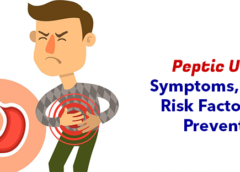Overview
Peptic ulcers are open sores which form in your stomach’s inner lining and the upper portion of your small intestine. Stomach pain is the commonest symptom of a peptic ulcer.
Peptic ulcers include:
- Gastric ulcers which occur inside the stomach
- Duodenal ulcers inside the upper portion of the small intestine (duodenum)
Infection with the bacterium Helicobacter pylori (H. pylori) and long-term use of aspirin and no steroidal anti-inflammatory drugs (NSAIDs) (Advil, Aleve, others) are the most common causes of peptic ulcer. Stress and acidic foods are not responsible for peptic ulcers. They can also make the symptoms worse.
Symptoms
- Burning stomach pain
- Feeling of fullness, bloating or belching
- Fatty food intolerance
- Heartburn
- Nausea
The most common symptom of peptic ulcer is burning pain to the stomach. Stomach acid aggravates the discomfort, as does having an empty stomach. Eating other foods that reduce stomach acid or taking an acid-reducing drug may also ease the discomfort, but then it can come back. The pain between meals and at night can get worse.
About 3/4 of people with peptic ulcers have no symptoms.
Ulcers may cause serious signs or symptoms less frequently, like:
- Vomiting or vomiting blood — that can look red or black
- Dark blood in stools, or stools which are tarry or black
- Trouble breathing
- Feeling faint
- Nausea or vomiting
- Unexplained weight loss
- Appetite changes
When to see a doctor
Consult your doctor if you have the above serious signs or symptoms. If over-the-counter antacids and acid blockers ease the pain but the pain returns, also see the doctor.
Causes
Peptic ulcers occur as the acid eats away at the inner surface of the stomach or small intestine in the digestive tract. The acid can cause a painful open sore and can bleed.
Your digestive tract is filled with a coating of the mucous layer that usually protects against acid. But if there is an increase in the amount of acid or a decrease in the amount of mucus you can develop an ulcer. Common causes encompass:
A bacterium: Helicobacter pylori bacteria are commonly found in the mucous layer which covers and protects tissues which line the stomach and small intestine. Mostly, the H. Pylori bacterium does not cause any complications but can cause inflammation of the inner layer of the stomach resulting in an ulcer.
It’s not clear how H. pylori infection spreads. This can be transmitted by close touch from person to person, for example through kissing. People can also contract H. Pylori by food and water.
Regular use of certain pain relievers: Taking aspirin and other over-the-counter and prescription pain medications called non-steroidal anti-inflammatory drugs (NSAIDs) that irritate or inflammation your stomach and small intestine lining. Those medications include ibuprofen (Advil, Motrin IB, others), naproxen sodium (Aleve, Anaprox, others), ketoprofen, and others. They may not contain acetaminophen (Tylenol).
Peptic ulcers are more common in older adults who often take these pain drugs, or in people who take these osteoarthritis drugs.
Other medications: Taking some medicines with NSAIDs, such as steroids, anticoagulants, low-dose aspirin, selective serotonin reuptake inhibitors (SSRIs), alendronate (Fosamax) and risedronate (Actonel) that greatly increase the risk of developing ulcers.
Risk factors
- Besides taking NSAIDs, you can have a high risk of peptic ulcers if you:
- Smoke: Smoking may increase the risk of peptic ulcers in people infected with H, pylori.
- Drink alcohol: AL Alcohol will irritate and erode your stomach’s mucous lining and it increases the amount of stomach acid that is produced.
- Have untreated stress
- Eat spicy foods
Such causes alone do not cause ulcers but can make them worse and harder to heal.
Complications
Left untreated, peptic ulcers can result in:
Internal bleeding. Bleeding can occur as slow blood loss that leads to anaemia or as severe blood loss that may require hospitalization or a blood transfusion. Severe blood loss may cause black or bloody vomit or black or bloody stools.
Infection: Peptic ulcers can eat a hole through (perforate) your stomach wall or small intestine, putting you at risk of serious abdominal cavity (peritonitis) infections.
Obstruction: Peptic ulcers can obstruct the passage of food through the digestive tract, cause you to become full easily, vomit and lose weight through either inflammation swelling or scarring.
Prevention
If you follow the same techniques recommended as home remedies for treating ulcers, you can reduce your risk of peptic ulcer. It could also contribute to:
Protect yourself from infections: It’s not exactly clear how H. Pylori spreads, although there is some evidence that it can be transmitted by food and water from person to person.
You should take action to protect yourself against infections like H. Pylori, by washing your hands regularly with soap and water, and eating fully cooked foods.
Use caution with pain relievers If you use pain relievers frequently to raise your risk of peptic ulcer, take measures to lower your risk of stomach problems. For example, take your medication with meals.
Act with your doctor to determine the lowest possible dosage which will still alleviate the pain. When taking your medicine, stop consuming alcohol, because the two can combine to increase the risk of stomach upset.
You will also need to take other drugs, such as an antacid, a PPI, an acid blocker or a cytoprotective agent if you need an NSAID. A class of NSAIDs called COX-2 inhibitors may be less likely to cause peptic ulcers but the risk of a heart attack may increase.

Leave a Reply
You must be logged in to post a comment.